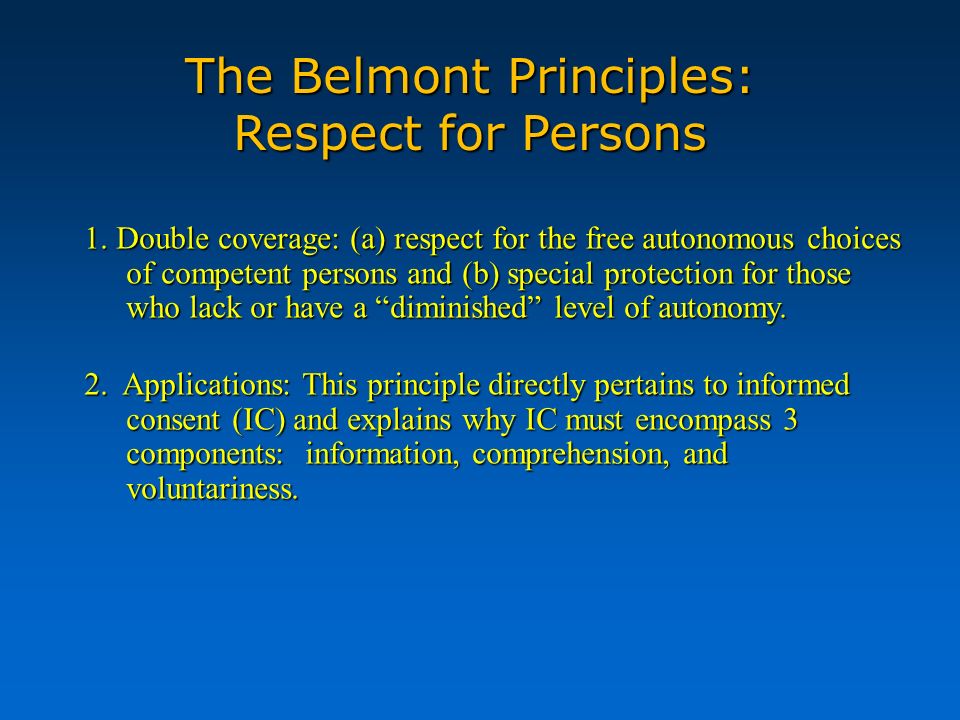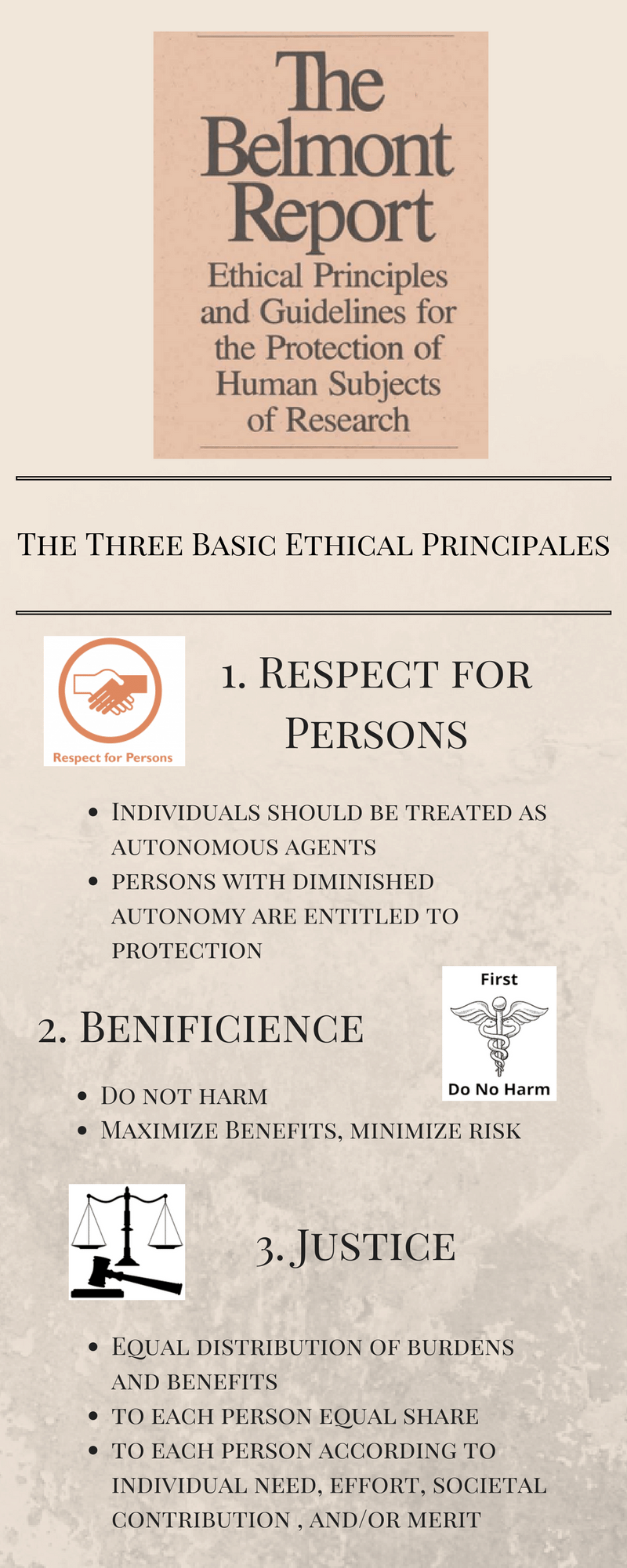Principle of Informed Consent as Described in the Belmont Report
What best describes the principle of informed consent as described in the Belmont Report. Unlike the Nuremberg Code and the Helsinki Declaration which set forth guidances or rules the Belmont Report establishes three fundamental ethical principles.

Pdf Revisiting The Belmont Report S Ethical Principles In Internet Mediated Research Perspectives From Disciplinary Associations In The Social Sciences Semantic Scholar
Ethical Principles and Guidelines for the Protection of Human Subjects was published in 1979.

. See answers 1 Ask for details. It is the outgrowth of an intensive four-day period of discussions that were held in February 1976 at the Smithsonian Institutions Belmont Conference Center supplemented by the monthly deliberations of the. The application of this principle involves an informed consent process during which subjects are provided all information.
Follow Report Log in. Best describes the principle of informed consent as described in the belmont report. They are informed consent assessment of risks and benefits and selection of subjects.
Principle of informed consent as described in the belmont report. All groups and messages. Which basic principle from the belmont report embodies the need for informed consent.
Which of the following best describes the principle of informed consent as described in the Belmont Report. Ensuring that confidentiality is maintained Which of the following best describes the principle of informed consent as described in the Belmont Report. Determining that the study has maximized benefits and minimized risks.
It is the outgrowth of an intensivefour-day period of discussions that were held in February 1976 at. In consideration of Respect for Persons investigator s should obtain voluntary inform ed consent of potential human subjects. Versus the 21st century.
Up to 10 cash back The Belmont Report has since served as a key reference in evaluating the ethical sensitivity of studies involving human participants. As the principles of the Belmont Report make clear promoting and confirming comprehension of the information provided to prospective participants is vital to ensuring that their decision to participate in research is in fact informed and voluntary. The Commission created as a result of the National Research Act of 1974 was charged with identifying the basic ethical principles that should underlie the conduct of biomedical and behavioral research involving human subjects.
It provides the philosophical underpinnings for current laws governing research with human subjects. Nature and definition of informed consent in various research settings. It is the outgrowth of an intensive four day period of discussions that were held in February 1976 at the.
The Belmont Report attempts to summarize the basic ethical principles identified by the Commission in the course of its deliberations. Insuring that the selection of subjects includes people from all segments of the population. Vanderpool Harold Y.
Ensuring that a subject is treated as an autonomous agent is a reflection of what ethical principle. Ethical Principles and Guidelines for the Protection of Human Subjects of Research. Voluntary informed consent means that subjects are given.
The nature and definition of informed consent in various research settings. THE BELMONT REPORT ETHICAL PRINCIPLES The Committee is in part guided by the ethical princi ples set forth in the Belmont Report. The Belmont Report summarizes ethical principles and guidelines for research involving human subjects.
Specifically the Belmont Report recommends that informed consent be sought that benefits and risks be evaluated and the selection representation and the burden of participation be fair and equitable. In consideration of Respect for Persons investigators should obtain voluntary informed consent of potential human subjects. Respect for persons beneficence and justice.
Furthermore in clinical research the risks and benefits of the. The Committee is in part guided by the ethical principles set forth in the Belmont Report. Describe the principle of informed consent as described in the belmont report.
The ³ of research involving human subjects. Unfortunately significant and persistent. These principles are Respect for Persons Beneficence and Justice.
Obtaining informed consent is a basic ethical obligation and a legal requirement for researchers. The Belmont Report attempts to summarize the basic ethical principles identified by the Commission in the course of its deliberations. The Belmont Report attempts to summarize the basic ethical principles identified by the Commission in the course of its deliberations.
The Belmont Report was written by the National Commission for the Protection of Human Subjects of Biomedical and Behavioral Research. Obtaining Informed Consent. The Belmont Report Belmont Report.
Three core principles are identified. Click here to get an answer to your question Describe the principle of informed consent as described in the belmont report. Three primary areas of application are also stated.
These principles are Respect for Persons Beneficence and Justice. This requirement is founded on the principle of respect for persons one of the 3 ethical principles governing human subject research described in the Belmont ReportThe principle of respect for persons requires that individuals be treated as autonomous agents and that the rights and.

The Belmont Principles Of Respect For Persons Beneficence And Justice Ppt Video Online Download

Comparison Of The Application Of The Respect For Persons Principle As A Download Scientific Diagram

From The Belmont Report To The Code Of Federal Regulations

Historical Context And Economic Issues Ethical Legal And Societal Implications Of Biotechnology
Comments
Post a Comment